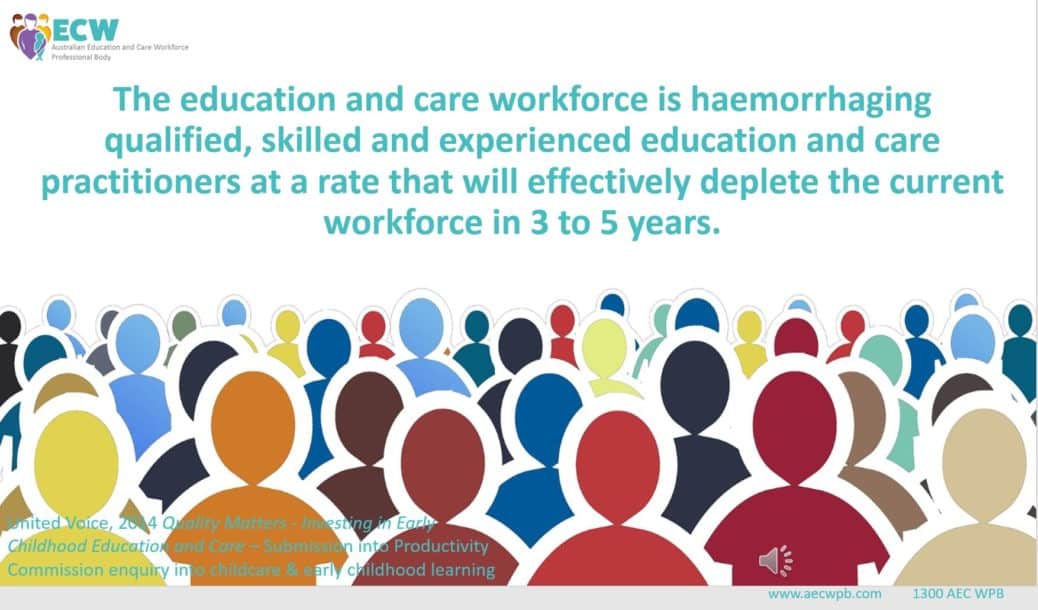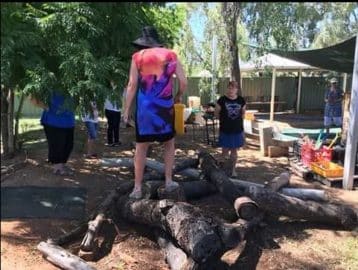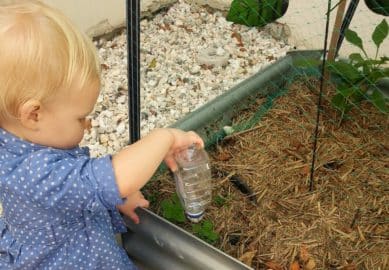Why does professional recognition continue to elude the education and care workforce?
Written by Lee Gane
Pay parity is seen by many as the answer to retaining education and care professionals an to professional recognition. I believe it is bigger than that. You just need to listen to our primary and secondary teacher colleagues who are also leaving the field in droves, pay is not the reason they are leaving and for many education and care practitioners it is more than the pay. Education and care professionals just want to be recognised and acknowledged, they want to feel valued. Education and care practitioners do not feel valued for their knowledge, skills or expertise simply because the qualifications are embedded in the care of young children, a job undertaken by every parent without the need for a qualification. This is where the pink collar label comes into play, our workforce is predominantly female and associated with the domestic work of women caring for children.
A highly skilled, qualified and experienced education and care professional can be a resource and support for parents who can draw on their professional knowledge of child development and working with children to assist with anything from teething and toileting to language or physical development, whether it’s insight into the why, sharing information through fact sheets or connecting with relevant local community organisations even when to refer on for specialised early intervention and supports. For many the biggest challenge for our profession is the perception that learning commences only within school environments and under formal instruction, definitely not through play. Our work with children is not visible unlike a tradie whose cert III or Diploma leads to repair or construct something where the impact and progress is immediate and visible.
Highly skilled, qualified and experienced education and care professionals have a wealth of knowledge and practice expertise. They have a vast knowledge of child development and through establishing and building a secure, trusting and respectful relationship with a child, they support the growth of a confident capable and resilient individual able to self-regulate behaviours, problem solve, hypothesise, explore, create and manage risks. Education and care practitioners support a child’s language, cognitive, physical, social and emotional development through individually identified and tailored early learning programs specifically designed to support and extend on developing skills and knowledge in a safe nurturing environment.
The work of education and care practitioners with children is foundational and critical for all future academic and social success.
The language used by the profession also paints practitioners as carers over educators for example many websites, services and job descriptions use the term childcare” which in itself aligns more with babysitting than early education. This perception of the role of practitioners, predominately as carers not only minimises the knowledge and expertise of professionals but misleads perspective education and care professionals, who come to the profession believing that the only role of professionals is to nurture, care for and keep children safe. All very important but only one aspect of the work undertaken daily by education and care professionals . Speak with a local director and they will have been approached by their local high school wanting to place a female student for work experience on the sole basis that they ‘love children’ and on that basis alone have deemed that working in education and care would be a suitable career choice. Many female school leavers unclear of their career options are often encouraged into education and care by well meaning family members for similar reasons. Whether in receipt of a newstart allowance and expected to study to retain a benefit or simply seeking job that doesn’t require a great deal of effort, playing with children all day appeals as an easy option for many. Reality hits hard and many then find the work and study is physically, mentally and emotionally demanding.
Due to the demands of the work, the lack of recognition and the lack of value placed on the work coupled with the below average wages 1 in 5 professionals leave the field every year. These staggering losses effectively deplete the workforce every 4-5 years. Constantly replenishing these numbers means that 70% of the workforce have only been in their role for 1-3 years. This has a significant impact on continuity of care and quality practices. That said our workforce is full of hardworking, dedicated and passionate practitioners who are striving to provide quality outcomes for children.
How can we have a strong professional voice when we have an unstable and predominantly inexperienced workforce?
The profession needs to do more to inform community of the real work undertaken by education and care professionals to ensure the field is attracting career minded professionals and more needs to be done to support the current workforce to grow in knowledge, skills and confidence. Unless we do more the cycle of attrition, attraction and recruitment will continue.
All of these factors undermine the education and care workforce’s ability to grow a strong professional footprint that can deliver quality outcomes for children and themselves.
I strongly believe that as a profession, together we can have a strong influential voice with the capacity to support and grow our workforce and our professional footprint which in time will elevate the image of the workforce, raise greater awareness of the complexities of the role that will realise the professions real worth. That is the vision…. The unknown is whether or not educators and ECT’s (EC practitioners) want this future enough to share and invest in the vision.









I cannot leave a “like”! (When I click on the heart, nothing happens!)
I could not agree more with the opinions expressed in this article. At times I feel distinctly depressed about this issue, which has plagued Early Childhood practitioners for the forty plus tears I have been involved in the profession.